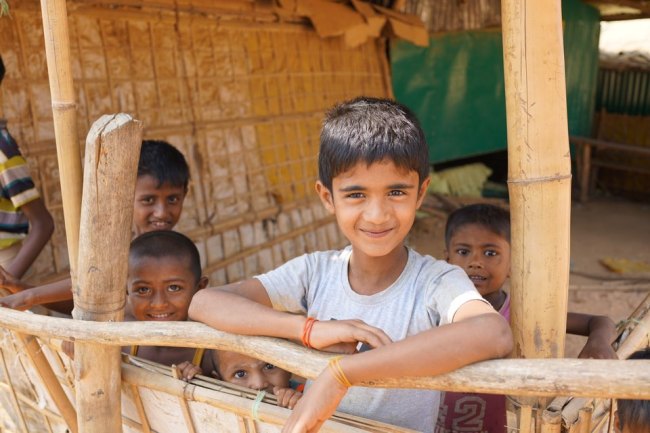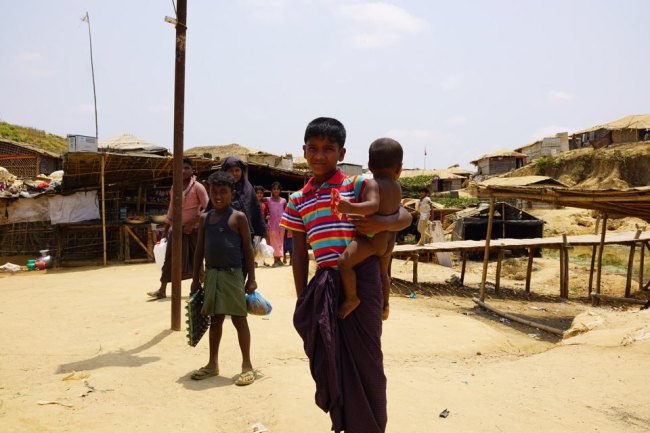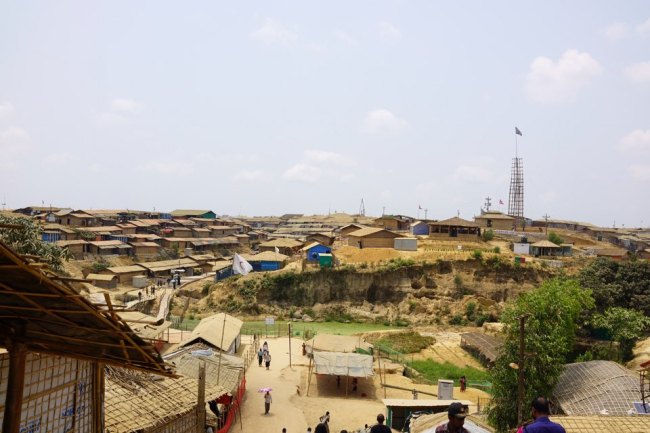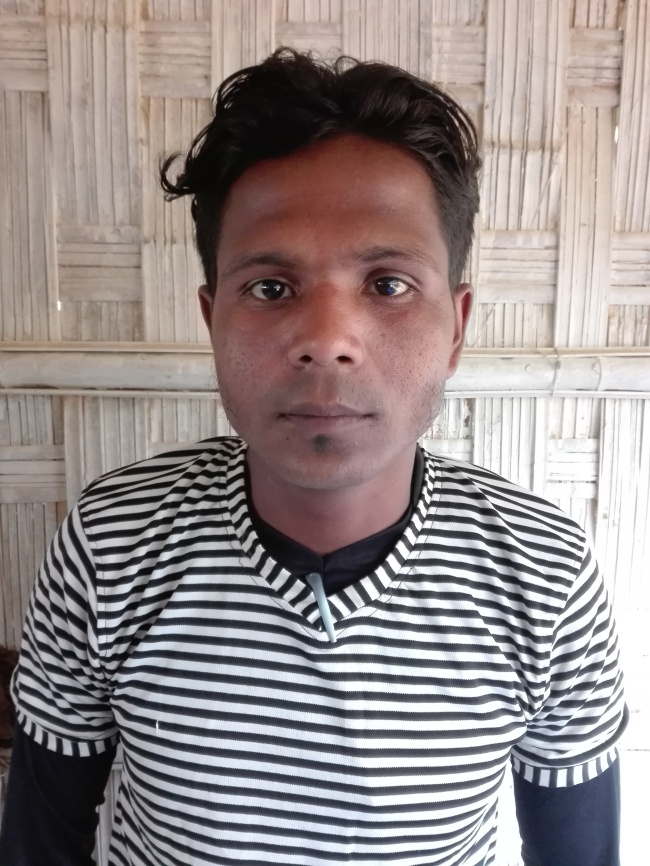[Feature] Rohingya refugees hesitant to return to Rakhine state
Bangladesh, overburdened, urges refugees to go back to Myanmar ahead of monsoon season
By Bak Se-hwanPublished : May 9, 2018 - 15:04
COX’S BAZAR, Bangladesh -- Fatema Begum, 18, vividly remembers one September morning last year when she was awakened by the sound of intense gunfire. Begum was in bed at her home in the coastal village of Inn Din, in the northern Rakhine state of Myanmar, when military vehicles moved in and troops began to surround the town. The sun rose and the military randomly fired at the houses.
“They don’t care if someone gets shot. They used rocket launchers to take down houses. My family quickly got out of our house when we saw smoke and fire and heard gunfire from many directions. We saw soldiers shooting people who were running away, or entering houses to see if there was anyone,” Begum told The Korea Herald.
Women with children were the most victimized of all because they were not able to quickly escape and were caught, according to Begum. “Then the military dragged them to an empty house and raped them brutally. They took one of my neighbors that way.”
A few days after hiding among the trees with little food or water, Begum’s family returned to their home. They saw decaying corpses in their backyard. They realized all human rights would be denied to them and they would continue to be discriminated against at their own home. The survivors decided to cross the Naf River in a boat to Shah Porir Dwip, Bangladesh, Begum said.
She and her family belong to one of the most persecuted ethnic groups in the world today -- the Rohingya.
“They don’t care if someone gets shot. They used rocket launchers to take down houses. My family quickly got out of our house when we saw smoke and fire and heard gunfire from many directions. We saw soldiers shooting people who were running away, or entering houses to see if there was anyone,” Begum told The Korea Herald.
Women with children were the most victimized of all because they were not able to quickly escape and were caught, according to Begum. “Then the military dragged them to an empty house and raped them brutally. They took one of my neighbors that way.”
A few days after hiding among the trees with little food or water, Begum’s family returned to their home. They saw decaying corpses in their backyard. They realized all human rights would be denied to them and they would continue to be discriminated against at their own home. The survivors decided to cross the Naf River in a boat to Shah Porir Dwip, Bangladesh, Begum said.
She and her family belong to one of the most persecuted ethnic groups in the world today -- the Rohingya.

That morning, 10 Rohingya Muslim men were massacred by Myanmar soldiers in what Rakhine State claims was part of lawful “clearance operations” that only targeted militants. More than 10,000 deaths have been reported as the result of Myanmar’s military campaign since Aug. 25, 2017, according to Doctors Without Borders.
Families from Inn Din, a once tight-knit village burned to the ground on that September day, are now scattered across the world’s largest refugee camp, located in Bangladesh. Nearly 700,000 Rohingya Muslims live in the temporary camp in Cox’s Bazar located on Bangladesh’s southeastern coast, crammed into crowded shelters made of polythene or tarpaulin sheets.

Rajuma Khatun, 23, lost his brother during the perilous travel to Bangladesh.
“It was 23rd of September when we started walking the western Maungdaw of Myanmar to cross the river, and it was a rainy day. It was me, my brother, Md Shofi and my parents. It took us 14 days to reach Maungdaw, avoiding being caught by the military. Those 14 days were the most dangerous days of my life. We ran out of food after three days and rest of the days we starved. On the way, my brother was lost and until now we haven‘t found him,” Khatun said.
Both Khatun and Begum fear going back home.
Haunted by their memories and stories of the mass killings and gang rape, the two said they don’t want to suffer another loss of their loved ones. The Rohingya people must be guaranteed human rights, and without these guarantees, it is not possible for them to go back, they say.

Despite the alleged state-sponsored destruction of hometowns and mass killings against the Muslim minority group in the majority Buddhist nation, Bangladesh and the United Nations are stepping up pressure on Myanmar to speed up repatriation.
Bangladesh’s Foreign Minister Abul Hassan Mahmood Ali said during a conference with foreign journalists on April 13 that his country cannot afford to “take more refugees” as it is already one of the most densely populated countries in the world.
The upcoming monsoon season that is expected to cause mudslides and disease in the camp is yet another reason why the Bangladesh government is keen to see refugees to return home.
But many refugees, including Khatun and Begum, are reluctant to return home, unsure whether there will be enough security there.
The refugees also fear they would face concentration camp-like conditions upon returning to Myanmar. Myanmar Social Welfare Minister Win Myat Aye announced earlier in April that Rohingya would be sent to a transit camp for only about a month, while new villages are being built.
“Right now in the camp, they have shelter. They get food and household stuff like buckets, cooking materials and gas stove. And most importantly, they have a sense of security while staying here. This is not the right time to talk about sending them back home, not until conditions become favorable to Rohingyas in Myanmar,” said an NGO worker in the Rohingya camp who asked not to be named.
“I think the Myanmar government should admit and take responsibility for ethnic cleansing against Rohingyas committed by its military. They must recognize them as rightful Myanmar nationals and come up with measures to stop any discrimination, since they have lost everything. And Bangladesh and the international community can pressure the country to do so,” the NGO worker said.
“Above all, the world should give Rohingyas more help to ensure that they can lead a respected and dignified life when they return home,” he said.
Myanmar’s army chief, Senior Gen. Min Aung Hlaing, accused by the United Nations of ordering the ethnic cleansing of Rohingya Muslims, denies the allegation.
Separately, de facto President Aung San Suu Kyi’s government has blocked access to a separate UN investigation team, while the state of Rakhine remains off limits to journalists, with only carefully managed press tours allowed.
Ibrahim, 26, another Rohingya Muslim who brought his wife and two daughters to the camp, said his dream is to “return home safely with my family.”

“Now I’ve been here for more than six months. In my opinion, the hardest part about living in the camp here is that most of the time someone decides what you eat and where you can and can’t go,” Ibrahim said.
“I miss my neighborhood, I miss my neighbors, I miss my home made with bricks with iron sheeting roofs. I want to return home, I know it still remains a dream for now,” Ibrahim added.
“I want no harm to my family, or to me.”
By Bak Se-hwan (sh@heraldcorp.com)







![[KH Explains] Hyundai's full hybrid edge to pay off amid slow transition to pure EVs](http://res.heraldm.com/phpwas/restmb_idxmake.php?idx=644&simg=/content/image/2024/04/18/20240418050645_0.jpg&u=20240419100350)






![[From the Scene] Monks, Buddhists hail return of remains of Buddhas](http://res.heraldm.com/phpwas/restmb_idxmake.php?idx=652&simg=/content/image/2024/04/19/20240419050617_0.jpg&u=20240419175937)

![[KH Explains] Hyundai's full hybrid edge to pay off amid slow transition to pure EVs](http://res.heraldm.com/phpwas/restmb_idxmake.php?idx=652&simg=/content/image/2024/04/18/20240418050645_0.jpg&u=20240419100350)

![[Today’s K-pop] Illit drops debut single remix](http://res.heraldm.com/phpwas/restmb_idxmake.php?idx=642&simg=/content/image/2024/04/19/20240419050612_0.jpg&u=)